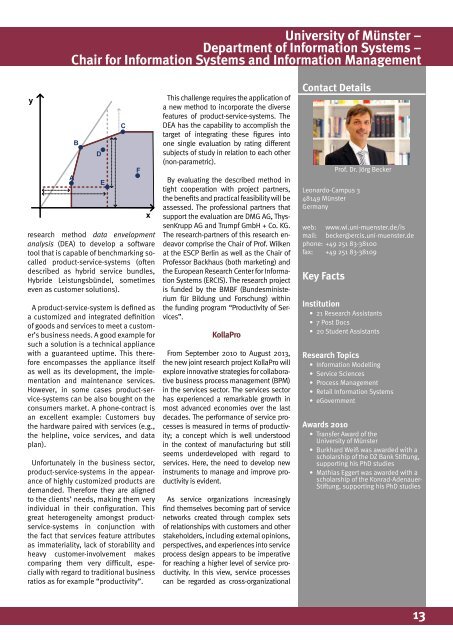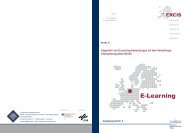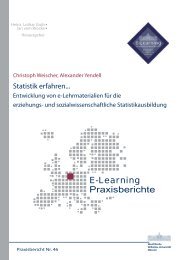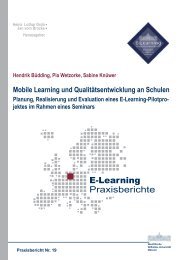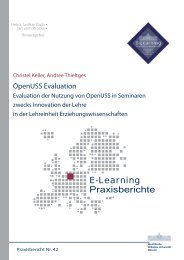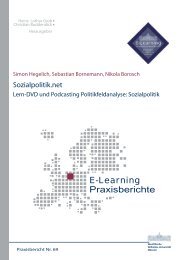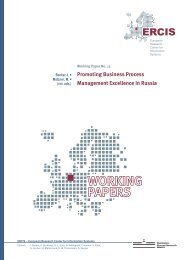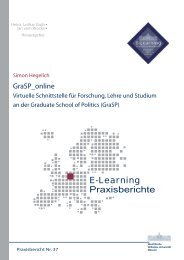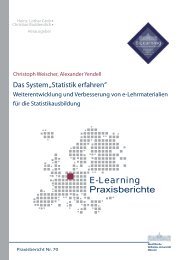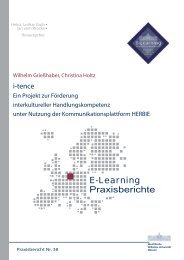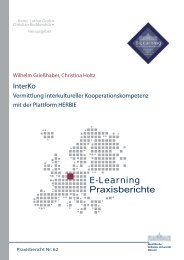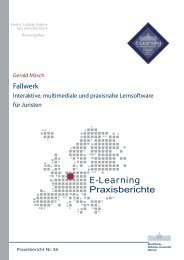2010 - ERCIS
2010 - ERCIS
2010 - ERCIS
You also want an ePaper? Increase the reach of your titles
YUMPU automatically turns print PDFs into web optimized ePapers that Google loves.
y<br />
University of Münster –<br />
Department of Information Systems –<br />
Chair for Information Systems and Information Management<br />
A<br />
B<br />
research method data envelopment<br />
analysis (DEA) to develop a software<br />
tool that is capable of benchmarking socalled<br />
product-service-systems (often<br />
described as hybrid service bundles,<br />
Hybride Leistungsbündel, sometimes<br />
even as customer solutions).<br />
A product-service-system is defined as<br />
a customized and integrated definition<br />
of goods and services to meet a customer’s<br />
business needs. A good example for<br />
such a solution is a technical appliance<br />
with a guaranteed uptime. This therefore<br />
encompasses the appliance itself<br />
as well as its development, the implementation<br />
and maintenance services.<br />
However, in some cases product-service-systems<br />
can be also bought on the<br />
consumers market. A phone-contract is<br />
an excellent example: Customers buy<br />
the hardware paired with services (e.g.,<br />
the helpline, voice services, and data<br />
plan).<br />
Unfortunately in the business sector,<br />
product-service-systems in the appearance<br />
of highly customized products are<br />
demanded. Therefore they are aligned<br />
to the clients’ needs, making them very<br />
individual in their configuration. This<br />
great heterogeneity amongst productservice-systems<br />
in conjunction with<br />
the fact that services feature attributes<br />
as immateriality, lack of storability and<br />
heavy customer-involvement makes<br />
comparing them very difficult, especially<br />
with regard to traditional business<br />
ratios as for example “productivity”.<br />
D<br />
E<br />
C<br />
F<br />
x<br />
This challenge requires the application of<br />
a new method to incorporate the diverse<br />
features of product-service-systems. The<br />
DEA has the capability to accomplish the<br />
target of integrating these figures into<br />
one single evaluation by rating different<br />
subjects of study in relation to each other<br />
(non-parametric).<br />
By evaluating the described method in<br />
tight cooperation with project partners,<br />
the benefits and practical feasibility will be<br />
assessed. The professional partners that<br />
support the evaluation are DMG AG, ThyssenKrupp<br />
AG and Trumpf GmbH + Co. KG.<br />
The research-partners of this research endeavor<br />
comprise the Chair of Prof. Wil ken<br />
at the ESCP Berlin as well as the Chair of<br />
Professor Backhaus (both marketing) and<br />
the European Research Center for Information<br />
Systems (<strong>ERCIS</strong>). The research project<br />
is funded by the BMBF (Bundesministerium<br />
für Bildung und Forschung) within<br />
the funding program “Productivity of Services”.<br />
KollaPro<br />
From September <strong>2010</strong> to August 2013,<br />
the new joint research project KollaPro will<br />
explore innovative strategies for collaborative<br />
business process management (BPM)<br />
in the services sector. The services sector<br />
has experienced a remarkable growth in<br />
most advanced economies over the last<br />
decades. The performance of service processes<br />
is measured in terms of productivity;<br />
a concept which is well understood<br />
in the context of manufacturing but still<br />
seems underdeveloped with regard to<br />
services. Here, the need to develop new<br />
instruments to manage and improve productivity<br />
is evident.<br />
As service organizations increasingly<br />
find themselves becoming part of service<br />
networks created through complex sets<br />
of relationships with customers and other<br />
stakeholders, including external opinions,<br />
perspectives, and experiences into service<br />
process design appears to be imperative<br />
for reaching a higher level of service productivity.<br />
In this view, service processes<br />
can be regarded as cross-organizational<br />
Contact Details<br />
Leonardo-Campus 3<br />
48149 Münster<br />
Germany<br />
Prof. Dr. Jörg Becker<br />
web: www.wi.uni-muenster.de/is<br />
mail: becker@ercis.uni-muenster.de<br />
phone: +49 251 83-38100<br />
fax: +49 251 83-38109<br />
Key Facts<br />
Institution<br />
• 21 Research Assistants<br />
• 7 Post Docs<br />
• 20 Student Assistants<br />
Research Topics<br />
• Information Modelling<br />
• Service Sciences<br />
• Process Management<br />
• Retail Information Systems<br />
• eGovernment<br />
Awards <strong>2010</strong><br />
• Transfer Award of the<br />
University of Münster<br />
• Burkhard Weiß was awarded with a<br />
scholarship of the DZ Bank Stiftung,<br />
supporting his PhD studies<br />
• Mathias Eggert was awarded with a<br />
scholarship of the Konrad-Adenauer-<br />
Stiftung, supporting his PhD studies<br />
13


